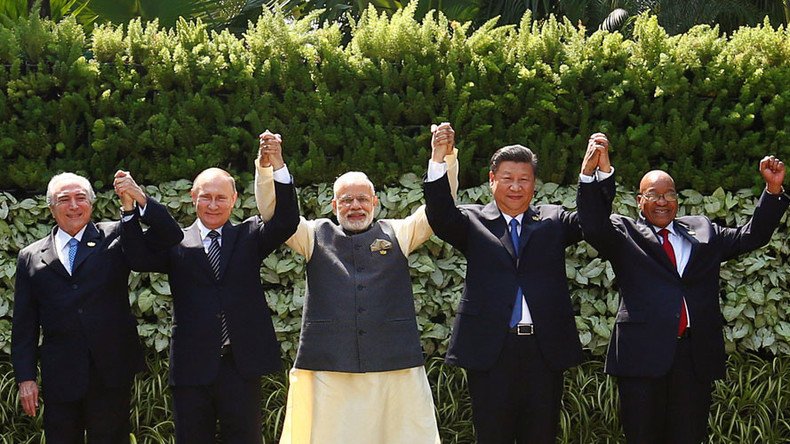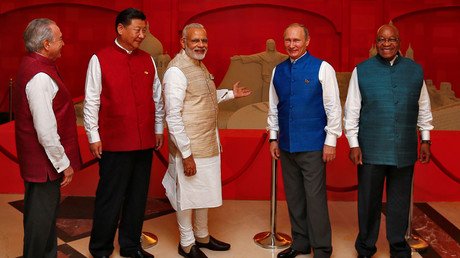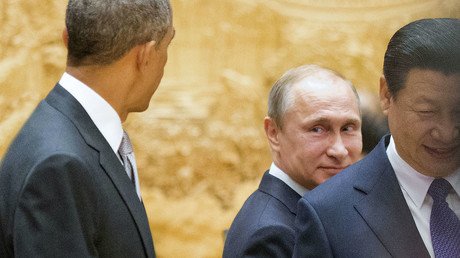BRICS continues its advance, one step at a time

The narrative concerning BRICS in the Beltway/Wall Street axis predictably spans two vectors; the five-member emerging power group – over 22 percent of global GDP, over 40 percent of global population – is either 'in crisis' or dismissed as irrelevant.
This is the Goa Declaration, summarizing the results of the annual BRICS meeting held this past weekend in India. Apparently there’s not much that meets the eye. Yet President Putin once again stressed the context; this is a long-term project, a “key element” in the embryonic multipolar world, driven by nations that don’t accept “power pressure” and attempted “targeting of sovereignty” by the usual suspects.
Economically, prospects for the BRICS are not as dire as a year ago. The medium-term scenario spells out stability in commodity prices. Even the IMF – always not to be fully trusted – bets on Russia growing 1.1 percent in 2017 (after a 3.7 percent recession in 2015) while Brazil might grow 0.5 percent.
Always looking at The Big Picture, Putin put on a brave face – stressing BRICS integration via more than 30 ministry-level teams working on common political, economic, humanitarian, security and social projects, as well as major advances such as the New Development Bank (NDB) and the proposed, $200 billion BRICS reserve currency mechanism.
Brazil as Trojan Horse?
This was a very tricky BRICS meeting. For the first time Brazil was represented by Temer the Usurper – the beneficiary of the recent institutional/parliamentary/judicial/media impeachment farce in Brasilia that ended up sharply steering Brazil towards a neoliberal “paradise” very much aligned with Washington’s interests – and away from the BRICS platform.
Former President Dilma Rousseff had a very productive relationship with the key “RC” in BRICS – Putin and China’s Xi Jinping. It’s a graphic sign that Putin held bilaterals in Goa with all other BRICS leaders, except Temer. They did talk briefly during the official dinner about Brazil’s economic “reforms” – shorthand for the ongoing neoliberal shock.
While Moscow carefully evaluates which way Brazilian loyalties are swinging, Temer The Usurper, for his part, sold the fantasy that Brazil is back in business. No, it’s not. A cursory look at the numbers reveals unemployment at an 11.2 percent historic high; monster interest rates (14.25 percent a year); the largest GDP contraction among BRICS nations in 2015 (3.8 percent); and the highest accumulated rate of inflation in one year (8.48 percent).
Business was done in Goa. Russia and India signed no less than 18 agreements – from energy to weapons. The BRICS business council once again encouraged the creation of a new rating agency for emerging powers, away from the American cartel.
And then there was the BRICS-BIMSTEC meeting. BIMSTEC is about “multi-sectoral technical and economic cooperation” between South Asia and Southeast Asia, uniting member states India, Bangladesh, Myanmar, Thailand, Bhutan, Nepal and Sri Lanka. It’s a sort of BRICS extension, Chinese New Silk Roads-style.
'Obama cyber saber-rattling against Russia possible ploy to boost Clinton camp' (Op-Edge) https://t.co/Ge9KsBAtby
— RT (@RT_com) October 15, 2016
In all the discussions, it’s clear that the BRICS’s main drive continues to be setting up a credible, alternative financial architecture privileging the developing world – something at which the Bretton Woods system miserably failed.
In parallel, the BRICS keep on trying to change the – rigged - system from the inside; “We call for the advanced European economies to meet their commitment to cede two chairs on the Executive Board of the IMF. The reform of the IMF should strengthen the voice and representation of the poorest members of the IMF, including Sub-Saharan Africa." It won’t happen anytime soon, tough. Last week, the IMF announced it has postponed the timetable for completing its review of quotas until 2019.
It’s also crucial for the BRICS to “condemn unilateral military interventions and economic sanctions in violation of international law and universally recognized norms of international relations." The message to the usual suspects is unambiguous.
Same about the BRICS’s support, post-Iran nuclear deal, for the use of civilian nuclear energy: “We underline the importance of predictability in accessing technology and finance for expansion of civil nuclear energy capacity which would contribute to the sustainable development of BRICS countries."
Unlike the usual suspects, the BRICS are firm supporters of the WTO as “the cornerstone of a rule based, open, transparent, non-discriminatory and inclusive multilateral trading system.”
Thus the inevitable opposition between the BRICS and the lame duck Obama administration-pushed TPP and TTIP: "We note the increasing number of bilateral, regional, and plurilateral trade agreements, and reiterate that these should be complementary to the multilateral trading system and encourage the parties thereon to align their work in consolidating the multilateral trading system under the WTO in accordance with the principles of transparency, inclusiveness, and compatibility with the WTO rules."
As much as TPP and TTIP undermine the WTO, the BRICS insist the current UN system undermines the UN itself. Thus the need for a “comprehensive reform of the UN, including its Security Council, with a view to making it more representative, effective and efficient.” This implies, crucially, that “RC” – united in a strategic partnership – agree that Brazil, India and South Africa should "play a greater role in the UN".
Undermining the Circus Maximus
Arguably, BRICS power as it stands in the current geopolitical juncture is all about “RC”. So Premier Modi must have been the host in Goa, but the sound bites of choice, predictably, were all Putin’s.
No wonder; Cold War 2.0 is in full effect – with Russia, not China, demonized to Kingdom Come. Thus Putin on “how the US does not accept compromises, which is necessary to solve issues in world politics. Rather, it chooses a ‘counterproductive’ policy of sanctions (…) Apparently, they don't want to compromise, they only want to dictate. Such a style has formed over the past 15-20 years in the US, and they still can't deviate from it."
Add to it Putin’s non-surprise about US Vice President Joe Biden's recent threats: "One can expect anything from our American friends. What has he revealed that is new? Don't we already know that US officials snoop and eavesdrop on everyone…[Washington] spends billions of dollars" on its secret services spying "not only on its potential opponents, but on its closest allies as well."
And finally, the convenience for the neocon/neoliberalcon axis of having a handy Russian bogeyman: "Portraying Iran and the Iranian nuclear threat as an enemy didn’t work. [Portraying] Russia [as an enemy] seems more interesting. In my opinion, this particular card is now being actively played."
Beyond BRICS, trends are clear. International investors couldn’t care less about austerity-ridden and fear-plagued Europe. China remains a magnet, with Tencent and Alibaba, for instance, leading China’s 47 percent share of global electronic commerce. Russia and Brazil will soon become “attractive” again. Quietly, one step at a time, the BRICS advance their power play, either via the NDB or the rating agency for emerging economies - immune to the Beltway’s Maximum Hysteria Circus.
The statements, views and opinions expressed in this column are solely those of the author and do not necessarily represent those of RT.















